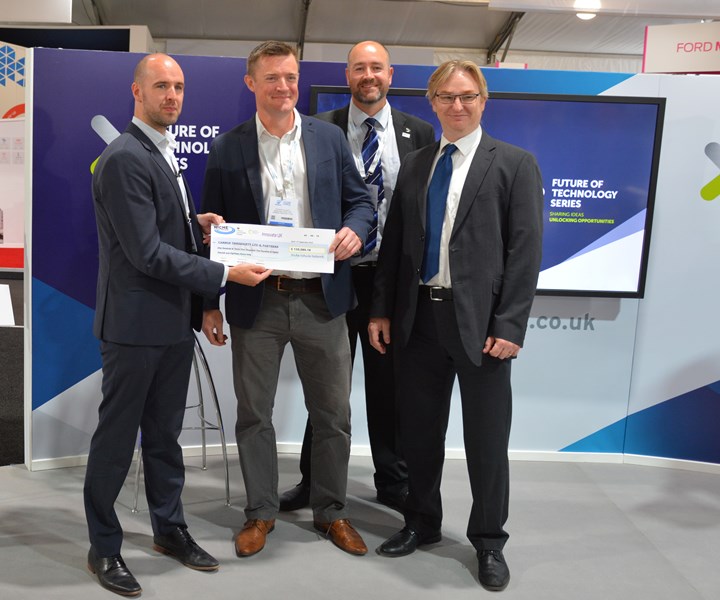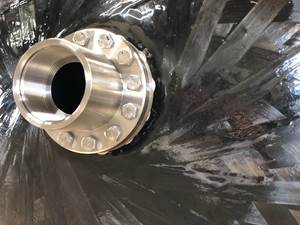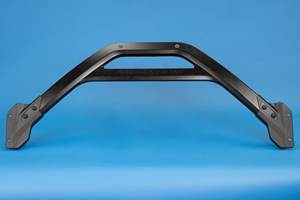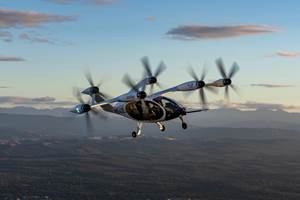All-composite wheel for electric vehicles wins funding
A project to develop the world’s first commercially viable, low cost, lightweight, all-composite wheel for electric and niche vehicles such as driverless cars wins grant funding of £135,500.
Share
Read Next

The ACRIM (All Composite Reduced Inertia Modular Wheels) wheel project, which is being developed by a consortium of UK composite experts comprising Carbon ThreeSixty, Far UK and Bitrez Ltd, has won funding from the Niche Vehicle Network. Source | Carbon ThreeSixty
A project to develop the world’s first commercially viable, low-cost, lightweight, all-composite wheel for electric and niche vehicles such as driverless cars, last-mile delivery vehicles, road sweepers and next-generation agricultural vehicles has won grant funding of £135,500. The ACRIM (All Composite Reduced Inertia Modular Wheels) wheel project, which is being developed by a consortium of U.K. composite experts comprising Carbon ThreeSixty (Wiltshire, U.K.), Far UK (Nottingham, U.K.) and Bitrez Ltd. (Wigan, U.K.), won the funding after entering a competition presented by the Niche Vehicle Network, an independent association aimed at promoting and stimulating R&D collaboration and partnership working to support the growth of U.K. niche vehicle manufacturers and their U.K. supply chains.
The consortium says its all-composite wheel will be 4 kilograms lighter than a generic 8-kilogram 15-inch wheel, and is predicted to provide efficiency gains of 5-10% representing a 5% fuel saving or a 5% CO2 reduction when retrofitted to a petrol- or diesel-powered vehicle.
“Lightweighting of vehicles is a direct way of achieving efficiency gains, whether it’s reduced CO2 emissions from internal combustion engine vehicles or increased range on electric vehicles or saving weight so you can carry less for the same distance,” says lead project partner, Edward Allnutt, managing director at Carbon ThreeSixty, which specializes in the design and manufacture of advanced composite structures.
Cost, of course, is another important factor. Until now, carbon fiber wheels have largely been targeted to luxury and high-performance vehicles. High material and production costs have kept carbon fiber wheel designs out of reach of niche vehicle manufacturers and everyday consumers.
“How do we go about making a lightweight, efficient wheel at the price bracket that niche vehicle manufacturers and normal human beings would find attractive?” says Allnutt.
According to Allnutt, the ACRIM project is approaching the project as a multi-piece co-manufactured wheel. He stresses the wheel will not be manufactured with autoclaved prepreg. The project is exploring a modified epoxy wet resin process incorporating different noncrimp fabric preform manufacturing technologies including tailored fiber placement (TFP) and potentially integrating sheet molding compound (SMC).
The resin formulation partner for the project is Bitrez Ltd., Europe’s leading manufacturer of specialist polymers and chemicals. “We’re very proud to be the resin formulation partner for this project, developing high-performance, REACH compliant matrix systems to meet the demands of process and performance, whilst also investigating how more sustainable materials can play their part,” says Dominic Hopwood, the company’s sales manager. “The all-composite wheel demonstrates how the industry is helping to reduce the world’s carbon footprint. It’s lightweight and low-cost and will help save fuel, reduce carbon emissions and increase the number of miles an electric vehicle can travel.”
While still at the R&D level, the ACRIM project has an aim of medium volume production in the range of £200 ($246 USD) per wheel.
Over the next six months, the consortium will use the NVN funding to move the all-composite wheel from proof of concept through to demonstration and production readiness. According to Allnutt, the wheel’s effectiveness is set to be tested by two OEMs and a global Tier 1 wheel supplier: GKN (Redditch, U.K.), MeV (Mansfield, U.K.) and Microcab (Coventry, U.K.).
“Without funding from the Niche Vehicle Network this project would not have got off the ground,” Allnutt says, “The funding is enabling us to further invest in R&D and accelerate the time to market for innovative products such as the ACRIM-Wheel. Despite SMEs being the engine room for innovation within the U.K., we often struggle to access the finance required to exploit our ideas. Support from organizations such as the Niche Vehicle Network and Innovate UK enables us to do just that. The partnership for this project represents some of the foremost experts in the U.K. composites sector working together to launch a truly revolutionary product."
Lyndon Sanders, sales director at Far Composites, which specializes in the design and manufacture of lightweight structural composite components to reduce both weight and vehicle emissions, adds, “We are looking forward to this project. It feels like a great team and a light-weight and cost-effective wheel especially for new energy vehicles feels like a great place to make a difference.”
The funding from the Niche Vehicle Network will cover 50% of the project costs with the remainder coming out of the consortium’s resources.
Related Content
Infinite Composites: Type V tanks for space, hydrogen, automotive and more
After a decade of proving its linerless, weight-saving composite tanks with NASA and more than 30 aerospace companies, this CryoSphere pioneer is scaling for growth in commercial space and sustainable transportation on Earth.
Read MoreAutomotive chassis components lighten up with composites
Composite and hybrid components reduce mass, increase functionality on electric and conventional passenger vehicles.
Read MorePlant tour: Joby Aviation, Marina, Calif., U.S.
As the advanced air mobility market begins to take shape, market leader Joby Aviation works to industrialize composites manufacturing for its first-generation, composites-intensive, all-electric air taxi.
Read MoreJeep all-composite roof receivers achieve steel performance at low mass
Ultrashort carbon fiber/PPA replaces steel on rooftop brackets to hold Jeep soft tops, hardtops.
Read MoreRead Next
All-recycled, needle-punched nonwoven CFRP slashes carbon footprint of Formula 2 seat
Dallara and Tenowo collaborate to produce a race-ready Formula 2 seat using recycled carbon fiber, reducing CO2 emissions by 97.5% compared to virgin materials.
Read MorePlant tour: Daher Shap’in TechCenter and composites production plant, Saint-Aignan-de-Grandlieu, France
Co-located R&D and production advance OOA thermosets, thermoplastics, welding, recycling and digital technologies for faster processing and certification of lighter, more sustainable composites.
Read MoreVIDEO: High-volume processing for fiberglass components
Cannon Ergos, a company specializing in high-ton presses and equipment for composites fabrication and plastics processing, displayed automotive and industrial components at CAMX 2024.
Read More

























